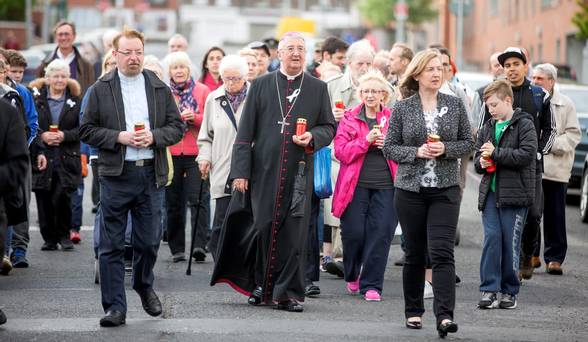Vatican's Man an Enigma Among His Own
By Michael Kelly
No man has done more to ensure that the Catholic Church in Ireland retains credibility than Archbishop Diarmuid Martin. It's a reputation that he has sometimes paid a heavy price for, but also one that he's been loath to claim credit for. A career Vatican diplomat, Martin (71) was thrust into the maelstrom in 2003 when Pope John Paul II handpicked him to return to his native Dublin to manage a Church in crisis. Cardinal Desmond Connell - then at the helm of the country's largest diocese - had been mortally wounded by the punishing revelations in Mary Raftery's 'Cardinal Secrets' documentary which exposed a corrupt culture that put the avoidance of scandal and the reputation of the Church ahead of the needs of children. To be fair to Connell, he had acted to remove abuser-priests from ministry, but, crucially, he had been lax in reporting suspected abusers to the civil authorities. Rome knew that Dublin needed urgent attention and it found it in the Pope's representative to Geneva, Diarmuid Martin. From his arrival, Martin pledged full co-operation with a judicial inquiry which had been established to investigate the handling of abuse allegations. He struck up an instant rapport with survivors who, before his arrival, had felt their concerns fell on deaf ears. Martin's advocacy was not without controversy. In 2007, Cardinal Connell took a High Court challenge to the archbishop's decision to hand over certain files to the Murphy Commission. After a Vatican intervention, the cardinal was persuaded to drop the case. The left-wing clerical group the Association of Catholic Priests (ACP) also criticised the archbishop, claiming he had vilified senior clergy. Raised in the Dublin suburb of Ballyfermot, his only sibling Seamus was a long-time Moscow correspondent for 'The Irish Times'. According to Seamus, Diarmuid was fascinated by buses as a child and had an encyclopaedic knowledge of Dublin's myriad bus routes. It was, perhaps, an early indicator of the attention to detail that those who work closely with him speak of. One former colleague who worked with the archbishop at the United Nations (UN) recalls how the chair of meetings would often seek Martin's advice on the minutia of international law. He was ordained a priest in 1969 just after the seismic reforms of Vatican II. He served for a year as a curate in Cabinteely before leaving for Rome in 1975 - he began working for the Vatican a year later and never served in Dublin again until his elevation as archbishop. His absence from the diocese means he is somewhat of an enigma to fellow clerics. At an age when most men are retired, Martin is running a complex diocesan structure with a multi-million-euro budget. With an estimated 1.2 million Catholics and 247 churches, Dublin remains the country's largest diocese. The number of priests in Dublin is set to plummet by as much as 70pc within the next 15 years, and some senior clerics grumble that Martin has done little to plan for the future. "He's a big-picture man," one priest says, "don't ask him about the bits and pieces of reform." Another cleric adds: "He's always right about the need for reform, but he rarely knows what reform is needed." Critics say that he has stubbornly resisted moves to close churches and amalgamate parishes instead appointing a single priest to cover more than one parish. While admitting that Mass attendance is in single figures in many city-centre parishes, Martin is evidently reluctant to go down in history as the Archbishop of Dublin who closed dozens of churches. His relations with other members of the hierarchy have often been tense. He admits that he has felt isolated, and senior bishops complain of a gruff manner during meetings. Someone who works closely with the archbishop, however, says that this is more out of a frustration at the slow pace of change rather than any desire to offend. Priests in Dublin are much divided about their leader, and it's a division that the archbishop hinted at in recent remarks to priests when he said candidly: "I apologise for the ways I know where my own ministry has not been as supportive of you as it should." "Please pray for me," he said. But, whatever misgivings there might be about Diarmuid Martin amongst his fellow bishops or clergy, he is universally popular amongst the people and well regarded by the commentariat. Admitting that he cried while reading reports of abuse in the diocesan archive, the archbishop spoke for many lay Catholics when he expressed his shame at how the Church handled abuse. Having spent much of his adult life living in Italy, the archbishop has a lifelong affinity for il Bel paese and is well-known in the corridors of the Vatican. All this has led to constant speculation that he will be recalled to Rome to take up a senior position. But the call has not come, and Martin rejects claims that he hankers after a position in the eternal city. More in the mould of Pope Francis than Benedict XVI, some Conservative Catholics complain that the archbishop is not a cultural warrior. He is, nonetheless, a loyal son of the Church. His eve-of-poll intervention against same-sex marriage coupled with his reflective assertion that the result marked a 'reality check' for the Church is classic Diarmuid Martin. In the event of a referendum on abortion, the archbishop's style and clarity could do much to convince middle-of-the-road voters to vote to retain the constitutional protection for the unborn.
|
.
Any original material on these pages is copyright © BishopAccountability.org 2004. Reproduce freely with attribution.
